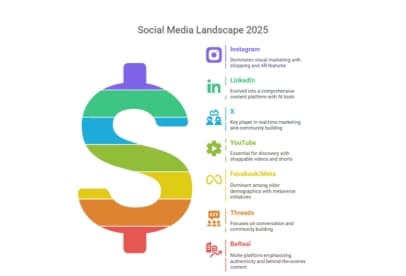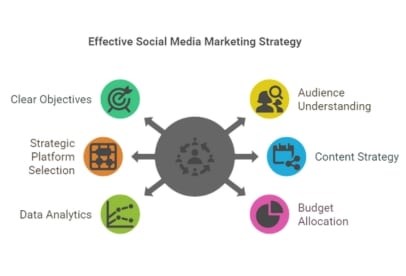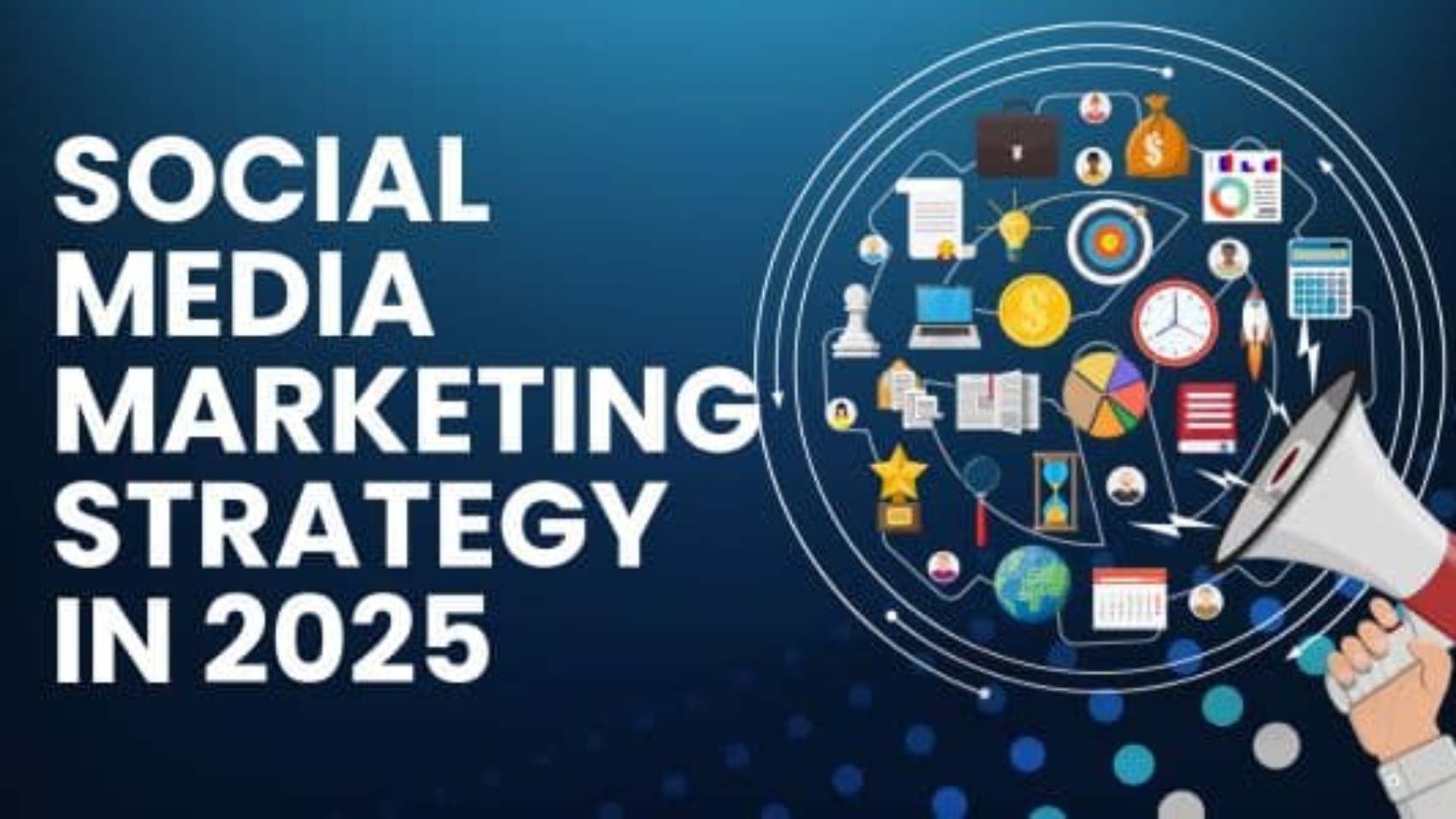In today’s hyper-connected world, social media has evolved from simple communication platforms to powerful marketing ecosystems. As we navigate 2025, businesses are discovering innovative ways to harness these digital channels to connect with audiences, build brand loyalty, and drive conversions. This article explores the current state of social media marketing, emerging trends, and strategies that businesses can implement to stay ahead in this dynamic landscape.
What is Social Media Marketing?

Social media marketing consists of creating and sharing content on social media platforms to achieve marketing and branding objectives. It includes activities like posting text and image updates and videos and engaging with your audience through comments, messages, and reactions. Beyond organic content, it encompasses paid social media advertising, influencer partnerships, social listening, and analytics.
In 2025, social media marketing has become more sophisticated, leveraging advanced technologies to create personalized experiences that resonate with target audiences.
Why Social Media Marketing is Essential for Businesses in 2025
Expanded Audience Reach

With over 5 billion social media users worldwide as of early 2025, these platforms offer unparalleled access to potential customers across geographic and demographic boundaries. The digital community continues to grow, providing businesses with an ever-expanding potential audience.
Cost-Effective Promotion

Compared to traditional advertising channels, social media marketing offers significantly lower costs while providing precise targeting capabilities. Even with modest budgets, businesses can achieve meaningful engagement and conversions.
Enhanced Customer Insights

Social platforms provide rich data about consumer behaviour, preferences, and engagement patterns. This goldmine of information allows businesses to refine their marketing strategies and product offerings based on real-time feedback.
Improved Customer Relationship Management

Social media facilitates direct communication with customers, enabling businesses to provide immediate support, gather feedback, and build community around their brands. This interactive communication builds loyalty and trust.
Competitive Edge

In 2025, businesses without a strategic social media presence will find themselves at a significant disadvantage. An effective social strategy has become a prerequisite for remaining competitive in most industries.
Leading Social Media Platforms in 2025

Still dominating visual marketing, Instagram’s integration of shopping features and enhanced AR capabilities provides seamless paths from discovery to purchase. The platform’s emphasis on creator tools has strengthened its position for influencer marketing.
Beyond B2B networking, LinkedIn has evolved into a comprehensive content platform. Its enhanced analytics tools and AI-powered networking suggestions make it invaluable for professional services and B2B companies.
X (formerly Twitter)
Despite numerous changes, X remains pivotal for real-time marketing, trend exploitation, and community building. Its subscription model has created new opportunities for content creators and brands.
YouTube
The platform’s position as a search engine second only to Google makes it essential for discovery. YouTube’s integration of shoppable video and enhanced short-form content features has bolstered its marketing utility.
Facebook/Meta
While youth engagement has declined, Facebook remains dominant among older demographics with significant purchasing power. Its metaverse initiatives are beginning to create novel marketing opportunities for forward-thinking brands.
Threads
Having established itself as a text-based community platform, Threads offers unique engagement opportunities focused on conversation and community building.
BeReal
Though still niche, BeReal’s authenticity-focused approach has created opportunities for brands willing to showcase their human side and behind-the-scenes content.
Emerging Social Media Marketing Trends in 2025

AI-powered content Creation and Optimization
Artificial intelligence tools now assist marketers in generating content ideas, optimizing posting schedules, and even creating initial drafts of posts. These tools analyze vast amounts of performance data to recommend content types most likely to resonate with specific audience segments.
Immersive Shopping Experiences
Augmented reality try-ons, virtual showrooms, and live shopping events have transformed social commerce. Consumers now expect interactive shopping experiences that blend entertainment with convenience.
Micro and Nano Influencer Dominance
While celebrity influencers maintain relevance, businesses are increasingly partnering with smaller, highly engaged community leaders who deliver authenticity and higher engagement rates despite smaller follower counts.
Short-Form Video Supremacy
Attention spans continue to favour concise, high-impact content. The most successful brands have mastered the art of communicating their value proposition in 60 seconds or less.
Community-Centric Approaches
Building engaged communities rather than accumulating passive followers has become the primary goal. Brands now focus on fostering conversation and connection among their audience members.
Value-Driven Content
Educational, informative, and problem-solving content consistently outperforms purely promotional material. Successful brands position themselves as valuable resources rather than just product providers.
Data Privacy and Transparency
With increasing regulation and consumer awareness, ethical data practices and transparency have become competitive advantages rather than compliance burdens.
Building an Effective Social Media Marketing Strategy in 2025

1. Define Clear Objectives
Begin with specific, measurable goals that align with your broader business objectives. Whether you’re focusing on brand awareness, lead generation, or customer retention, your social media activities should support these aims.
2. Understand Your Audience Deeply
Move beyond basic demographics to develop detailed customer personas that include psychographic information, platform preferences, content consumption habits, and pain points.
3. Select Platforms Strategically
Rather than maintaining a presence on every available platform, focus your resources on those where your target audience is most active and engaged. Quality presence on fewer platforms typically outperforms diluted efforts across many.
4. Create a Content Strategy
Develop a systematic approach to content creation that balances promotional material with value-driven content. Implement a content calendar that ensures consistency while allowing flexibility for real-time marketing opportunities.
5. Leverage Data Analytics
Utilize the robust analytics tools available across platforms to measure performance against KPIs. Be prepared to pivot strategies based on performance data rather than assumptions.
6. Allocate Budget Wisely
Balance organic content creation with paid promotion, recognizing that algorithm changes have made some level of paid amplification necessary for optimal reach on most platforms.
7. Maintain Authenticity
In an era of growing scepticism toward digital marketing, authentic communication that aligns with your brand values is essential for building trust and engagement.
Conclusion
As we progress through 2025, social media marketing continues to offer tremendous opportunities for businesses willing to adapt to changing platform dynamics and consumer expectations. Success requires a strategic approach that balances creativity with data-driven decision-making, authenticity with promotional goals, and consistency with adaptability.
By understanding the unique advantages of each platform, leveraging emerging technologies, and maintaining a focus on providing genuine value to your audience, your business can transform social media from a communication channel into a powerful growth engine. The landscape will undoubtedly continue to evolve, but the fundamental principle remains constant: meaningful connections with your audience are the foundation of social media marketing success.




Add a Comment